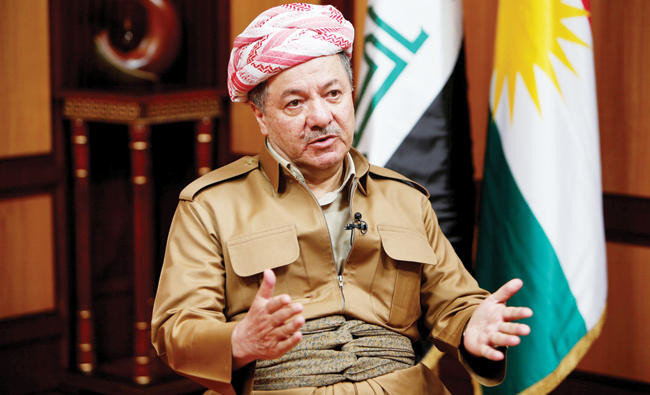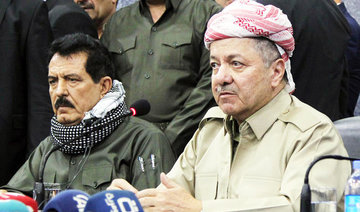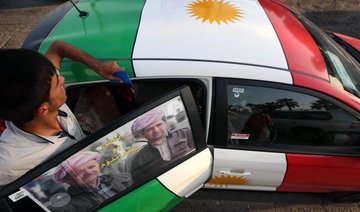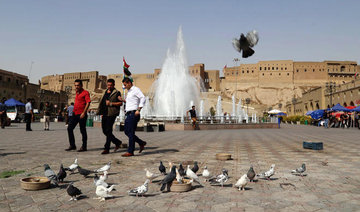SULAIMANIYAH, Iraq: Iraqi Kurdistan’s leader Masoud Barzani will not extend his presidential term beyond Nov. 1, a Kurdish government official said on Saturday.
A plan to divide up the president’s powers was outlined in a letter Barzani sent to the Kurdish Parliament on Saturday, which it will discuss on Sunday, the official said.
Parliament said it will meet on Sunday to redistribute the powers of Barzani.
On Tuesday, Parliament decided to freeze the activities of Barzani, his Vice President Kosrat Rasul and the head of the presidential Cabinet, Fuad Hussein.
Barzani came under growing opposition from his detractors after he organized the Sept. 25 referendum on Kurdish independence that triggered a deep crisis with Baghdad.
The federal government opposed the vote which it deemed unconstitutional, and its forces have since seized a swathe of disputed territory from Kurdish fighters.
Iraqi Kurdistan’s main opposition party, the Goran movement, called on Barzani to step down after the loss of Kurdish-controlled territory.
Kurdish MP Iden Maarouf said Parliament will meet on Sunday to see how best to “redistribute the president’s powers” among the legislative, executive and judicial authorities.
Earlier, Iraqi and Kurdish commanders made “progress” in talks on Kurdish fighters withdrawing from disputed areas, Iraq’s chief of staff said hours before a truce in clashes over a key border post was due to expire.
But Gen. Othman Al-Ghanimi told reporters after the talks in central Nineveh province that there are “sticking points” that still need to be resolved.
“We have reached an agreement on some points,” he said, adding that the Iraqi side is still waiting to hear from the Kurds on a number of other issues.
“There has been progress, but the definitive solution is in the hands of the other (Kurdish) delegation. They must return to Kurdistan for consultation and give us their answer,” Al-Ghanimi said. “We will remain in touch by phone,” he added.
(Iraqi Prime Minister Haider) Al-Abadi’s spokesman earlier Saturday told AFP that a “joint technical committee” comprising Iraqi and Kurdish delegates was meeting to find a solution to the standoff at the border post.
“The main task of this joint technical committee is to allow the deployment without violence of federal forces along the borders,” Saad Al-Hadithi said.
“Commanders of the federal forces and of the Peshmerga are meeting to allow for this redeployment in a peaceful and humane fashion,” he said.
The aim of the talks was to negotiate the return to a 2003 “blue line” restricting autonomous Iraqi Kurdistan to the three northern provinces of Irbil, Dohuk and Sulaimaniyah, said Al-Hadithi.
A Kurdish official said the US-led coalition pushed them toward negotiations.
Iraqi Kurdistan leader Barzani to step down, parliament to redistribute his powers
Iraqi Kurdistan leader Barzani to step down, parliament to redistribute his powers

Suspected Somali pirates seize a new Yemeni fishing boat in second recent attack

- Piracy off the Somali coast peaked in 2011 when 237 attacks were reported
DUBAI, United Arab Emirates: Suspected Somali pirates have seized another Yemeni fishing boat off the Horn of Africa, authorities said.
In a statement late Tuesday, a European naval force known as EUNAVFOR Atalanta said the attack targeted a dhow, a traditional ship that plies the waters of the Mideast, off the town of Eyl in Somalia.
It said the attack Monday remained under investigation. It comes 10 days after another pirate attack on another Yemeni fishing boat which ultimately ended with the pirates fleeing and the mariners on board being recovered unhurt.
Piracy off the Somali coast peaked in 2011 when 237 attacks were reported. Somali piracy in the region at the time cost the world’s economy some $7 billion — with $160 million paid out in ransoms, according to the Oceans Beyond Piracy monitoring group.
The threat was diminished by increased international naval patrols, a strengthening central government in Mogadishu, Somalia’s capital, and other efforts.
However, Somali pirate attacks have resumed at a greater pace over the last year, in part due to the insecurity caused by Yemen’s Houthi rebels launching their attacks in the Red Sea corridor over the Israel-Hamas war in the Gaza Strip.
In 2024, there were seven reported incidents off Somalia, according to the International Maritime Bureau.
After decades in exile, Syria’s Jews visit Damascus

- The new authorities have said all of Syria’s communities will play a role in their country’s future
- The synagogues and Jewish school in the Old City remained relatively well-preserved
DAMASCUS: For the first time in three decades, Rabbi Joseph Hamra and his son Henry read from a Torah scroll in a synagogue in the heart of Syria’s capital Damascus, carefully passing their thumbs over the handwritten text as if still in awe they were back home.
The father and son fled Syria in the 1990s, after then-Syrian president Hafez Assad lifted a travel ban on the country’s historic Jewish community, which had faced decades of restrictions including on owning property or holding jobs.
Virtually all of the few thousand Jews in Syria promptly left, leaving less than 10 in the Syrian capital. Joseph and Henry — just a child at the time — settled in New York.
“Weren’t we in a prison? So we wanted to see what was on the outside,” said Joseph, now 77, on his reasons for leaving at the time. “Everyone else who left with us is dead.”
But when Assad’s son and successor as president Bashar Assad was toppled in December, the Hamra family began planning a once-unimaginable visit to Damascus with the help of the Syrian Emergency Task Force, a US-based advocacy group.
They met with Syria’s deputy foreign minister at the ministry, now managed by caretaker authorities installed by the Islamist rebels who ousted Assad after more than 50 years of family rule that saw itself as a bastion of secular Arab nationalism.
The new authorities have said all of Syria’s communities will play a role in their country’s future. But incidents of religious intolerance and reports of conservative Islamists proselytizing in public have kept more secular-minded Syrians and members of minority communities on edge.
Henry Hamra, now aged 48, said Syria’s foreign ministry had now pledged to protect Jewish heritage.
“We need the government’s help, we need the government’s security and it’s going to happen,” he said.
Walking through the narrow passages of the Old City, a UNESCO-listed World Heritage Site, Henry and Joseph ran into their onetime neighbors — Palestinian Syrians — and later marveled at hand-painted Hebrew lettering at several synagogues.
“I want to see my kids come back and see this beautiful synagogue. It’s a work of art,” said Henry.
But some things were missing, he said, including a golden-lettered Torah from one of the synagogues that was now stored in a library in Israel, to where thousands of Syrian Jews fled throughout the 20th century.
While the synagogues and Jewish school in the Old City remained relatively well-preserved, Syria’s largest synagogue in Jobar, an eastern suburb of Damascus, was reduced to rubble during the nearly 14-year civil war that erupted after Assad’s violent suppression of protests against him.
Jobar was home to a large Jewish community for hundreds of years until the 1800s and the synagogue, built in honor of the biblical prophet Elijah, was looted before it was destroyed.
Lebanon official media says Israeli strike kills one in south

BEIRUT: Lebanese official media said Israel struck a southern town on Wednesday, killing one person, a day after Israeli troops withdrew from most of the border area apart from five points.
"An enemy drone struck a vehicle... in the town of Aita al-Shaab," near the southern border, the official National News agency said, reporting one person was killed.
Israel army says charges five soldiers for abusing Palestinian detainee

- The detention center near the Israeli border with Gaza was created to hold detainees from the Palestinian territory early in Israel’s war with Hamas
Jerusalem: The Israeli military said Wednesday it had filed charges against five reservist soldiers for abusing a Palestinian detainee in July last year.
“Today, the military prosecution has filed an indictment against five reservist soldiers under the charges of causing severe injury and abuse under aggravating circumstances... against a security detainee held in the Sde Teiman detention facility,” it said in a statement, referring to a site used to hold Gazans since the war began.
“The indictment charges the accused with acting against the detainee with severe violence, including stabbing the detainee’s bottom with a sharp object, which had penetrated near the detainee’s rectum,” the statement said.
It added “the acts of violence have caused severe physical injury to the detainee, including cracked ribs, a punctured lung and an inner rectal tear.”
It said the incident took place on July 5, 2024, following an instruction to conduct a search of the detainee during which he was “blindfolded, and cuffed at the hands and ankles.”
The detention center near the Israeli border with Gaza was created to hold detainees from the Palestinian territory early in Israel’s war with Hamas, sparked by the militant group’s unprecedented October 7, 2023 attack.
Earlier this month, an Israeli military court sentenced a soldier to seven months in prison after he admitted to “severely abusing” Palestinians at the same detention facility.
Baghdad-Beirut flights sell out ahead of Nasrallah funeral

- Beirut airport will close for four hours during the funeral
BAGHDAD: Flights from Baghdad to Beirut are nearly at capacity as airlines increase services ahead of Hezbollah leader Hassan Nasrallah’s funeral, officials said.
The pro-Iran group has called for a huge turnout when Nasrallah, killed in a September Israeli strike, is laid to rest in the Lebanese capital on Sunday.
“Iraqi Airways will increase its flights to Beirut from one flight a day to two, starting on February 20,” said transport ministry spokesperson Maytham Al-Safi, citing heightened demand ahead of the funeral.
An Iraqi airline official told AFP that “all seats on Iraqi Airlines flights from Baghdad to Beirut are booked.”
A source from Lebanon’s Middle East Airlines (MEA) reported increased flights between Baghdad and Beirut from Friday to Tuesday.
The airlines’ websites show that Iraqi Airways flights are fully booked until Sunday, with MEA nearly sold out.
Iraqi lawmakers and officials are expected to attend Nasrallah’s funeral privately, an Iraqi official said.
Representatives from pro-Iran Iraqi factions, Hezbollah’s longstanding allies in the Tehran-led “axis of resistance,” are also expected to participate.
Beirut airport will close for four hours during the funeral.
Hezbollah has said 79 countries would be involved in the commemoration, either officially or through “popular” support.
Sunday’s funeral will also honor Hashem Safieddine, a senior Hezbollah figure who had been chosen to succeed Nasrallah, before he was killed in an Israeli strike in October.
After decades at the helm of the group once seen as invincible, the killing of the charismatic Nasrallah sent shock waves across Lebanon and the wider region.
Since Nasrallah’s death, portraits of him, either alone or alongside other slain pro-Iran commanders, have been displayed throughout Baghdad and other areas of the Shiite-majority country.
On Sunday afternoon, thousands are expected to attend a “symbolic” procession for Nasrallah in Baghdad’s northwestern neighborhood of Kadhimiya, which is home to a Shiite shrine.


















